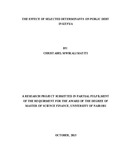The Effect of Selected Determinants on Public Debt in Kenya
| dc.contributor.author | Matiti, Christabel M | |
| dc.date.accessioned | 2013-11-11T12:48:26Z | |
| dc.date.available | 2013-11-11T12:48:26Z | |
| dc.date.issued | 2013 | |
| dc.identifier.citation | Master of Arts | en |
| dc.identifier.uri | http://erepository.uonbi.ac.ke:8080/xmlui/handle/123456789/58514 | |
| dc.description.abstract | Public debt refers to the total of the nation's debts which covers debts of local and state and national governments indicating how much public spending is financed by borrowing instead of taxation. A prudent public debt management helps economic growth and stability through mobilizing resources with low borrowing cost and limiting financial risk exposure. Budget deficit is a key component of Government borrowing. Governments borrow so as to help bridge the gap between the budgeted expenditure and the budgeted revenue. The recorded deficit is what will determine how much money Government will need to borrow in order to meet its budgetary allocations. The general prices of imported commodities have a great impact on the level of borrowing that a government can get into. The objective of the study was to establish the effect of selected determinants on public debt in Kenya. This study made use of descriptive study design and used secondary data. Annual data was used in the computations. The study covered ten years starting 2003 to the year 2012. The Data analysis was done using Statistical Package for Social Science (SPSS) and the presentations made using tables and figures. The findings established that there was a direct relationship between public debt and exchange rates, balance of payments and budget deficit. The policy makers need to evaluate the best exchange rate policy for optimal economic development. The study findings further established that debts and exchange rates had been increasing; grants had been decreasing over years, while budget deficits remained high in the country. This study recommends that budgeting process be controlled in order to reduce the debts which are leading to increasing public debts in Kenya. The study further recommends that the government should take measures to ensure that the decline in the grants being received is reversed. This will help in stabilizing the economy and enhancing economic growth while making sure that public debt is at manageable levels to avoid budget deficit. | en |
| dc.language.iso | en | en |
| dc.publisher | University of Nairobi | en |
| dc.title | The Effect of Selected Determinants on Public Debt in Kenya | en |
| dc.type | Thesis | en |
| local.publisher | School of Business | en |

